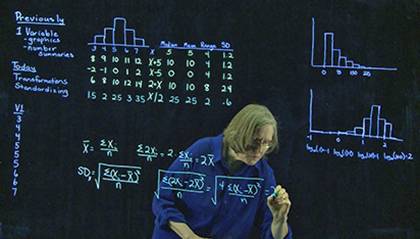
A decade after Duke's iPod experiment, this fall the Duke Digital Initiative (DDI) is challenging faculty and students to explore how emerging technologies like 3D printing and lightboards can be used in teaching and learning.
This year, DDI is offering grants to encourage faculty exploration in these focus areas:
- Educational video, including a specially designed lightboard, a "whiteboard without the white" that instead has a glass surface that can be drawn on while facing a camera. (Duke faculty have already started to experiment with a specially engineered version of the lightboard at Duke.)
- 3D printing and other "maker" technologies. Three 3D printers are already available in Duke's Multimedia Project Studios for use by the Duke community (Learn more on the OIT website.) Duke's Innovation Co-Lab also brought a BetaBox, or "mobile creativity lab," to campus earlier in the semester. Through DDI, faculty can request help in exploring those technologies further.
- Google Glass and other wearable technologies such as smartwatches and Fitbits.
- The repurposing of mass-market video games for education. "Many students entering college have a history of avid game playing, but they (and faculty) may not ever have thought about the transferable knowledge and skills they may learn from those games," Evans said. Modern video game technologies can offer many ways to leverage game-playing mechanics to support non-game applications in education, she said: "For example, how can you teach leadership using multi-user games such as World of Warcraft, that draw on social and problem-solving skills?"
"We have developed a culture at Duke for innovation in technology," said Elizabeth Evans, managing producer for DDI. "Students are exploring a wide range of new technologies before they come to our campus, and DDI is a way of enabling Duke faculty to explore how those technologies can enhance learning inside and outside the classroom."
In addition to the grant programs, DDI also is offering monetary support for faculty to attend innovative technology conferences, with the stipulation that attendees share what they learn there on campus.
Faculty can submit proposals for projects through Nov. 3; submissions will be considered after that date if funding is available. To submit a proposal and learn more about DDI, visit the DDI website.
DDI is a multi-year program of experimentation, development and implementation using new and emerging technologies in support of the university's teaching and learning mission. Since its inception in 2004, DDI has made available a variety of equipment, including iPods, tablets and Flip video cameras, and provides training and support to help faculty and students use the tools effectively.
Duke uses these pilot projects to guide decisions about how to incorporate the best uses of emerging technologies on the broadest scale, according to DDI's coordinators in the Office of Information Technology and the Center for Instructional Technology.
Early explorations of educational video production through DDI helped when Duke began exploring massive open online courses in 2012.
"We try things out, assess how they work over a year or two, and, based on that, they either get operationalized into the infrastructure or are discontinued," said Shawn Miller, CIT director. "We try to pilot technologies that are novel and experimental for most faculty and students, but which we think have real potential to make a positive impact in teaching and learning."